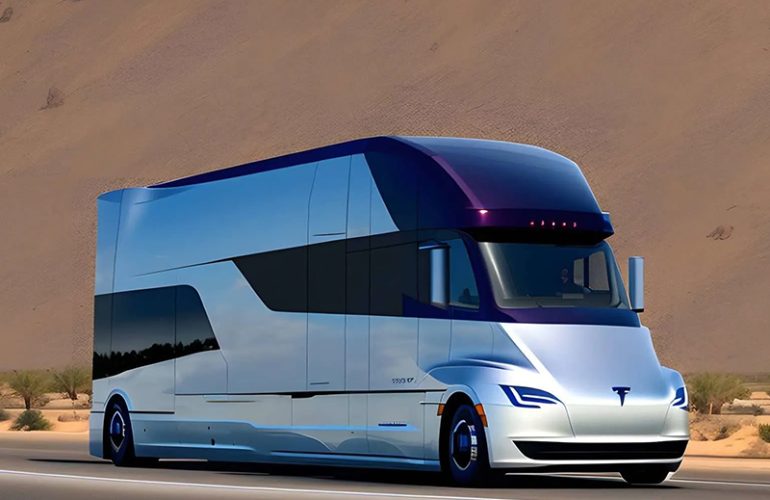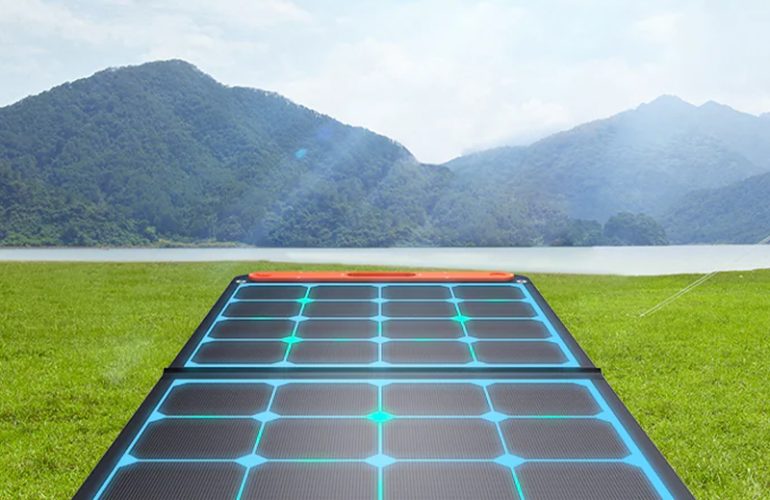A 12V lithium-ion battery is a common type of rechargeable battery that has a voltage of 12 volts (V). They are an application of lithium-ion technology and are used in a wide variety of applications such as automobiles, solar energy storage systems, portable electronic devices and other devices that require medium-voltage power supplies.
Best 12V Lithium Battery Packs
-
Sale!

12V 150Ah Lithium Battery
$689.00Original price was: $689.00.$356.00Current price is: $356.00. Enquiry -
Sale!

12V 100Ah Lithium Battery
$235.00Original price was: $235.00.$229.00Current price is: $229.00. Enquiry -
Sale!
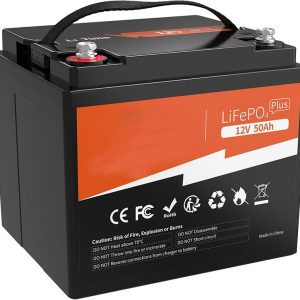
12V 50Ah Deep Cycle Lithium Battery
$335.00Original price was: $335.00.$298.00Current price is: $298.00. Enquiry -
Sale!
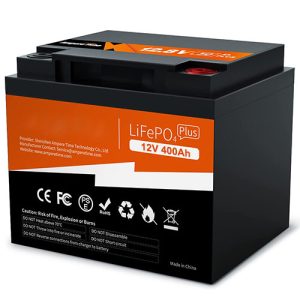
12V 400AH Deep Cycle Lithium ion Battery
$989.00Original price was: $989.00.$958.00Current price is: $958.00. Enquiry -
Sale!

12V 300Ah Lithium ion Battery
$899.00Original price was: $899.00.$599.00Current price is: $599.00. Enquiry -
Sale!

12v 200ah lithium ion battery
$235.00Original price was: $235.00.$198.00Current price is: $198.00. Enquiry
12V lithium battery video display
Features of 12V Lithium Battery
- >4000 Cycles at 80% depth of discharge
- Series and/or Parallel operation
- Automatic cell balancing system
- IP56 Water and Dust resistant Group 31 case
- Temperature monitoring
- Exceptional voltage stability
- Rugged mechanical design
- Maintenance free
- No hydrogen generation or gas
- <70% the weight of similarly sized SLA battery
Applications of 12V Lithium Battery
- Recreational Vehicles (RVs) and Campers: The battery can power the electrical systems in RVs, campers, or motorhomes. It can provide energy for lighting, appliances, water pumps, and other onboard electronics, allowing for extended periods of off-grid camping.
- Marine Applications: The battery can be used in small boats, sailboats, or yachts that require a 12V power supply. It can power navigation equipment, lighting, radios, and other onboard electronics.
- Off-Grid Solar Systems: The battery can be utilized in off-grid solar power installations for cabins, remote homes, or other applications where grid access is limited. It can store energy generated by solar panels during the day and supply power during the night or when solar production is low.
- Camping and Outdoor Activities: The battery can power various camping equipment, such as portable refrigerators, fans, lights, or charging stations for electronic devices. It allows for convenient and reliable power during outdoor adventures.
- Emergency Backup Power: The battery can serve as a backup power source for critical equipment or during power outages. It can power essential devices such as medical equipment, communication systems, or security systems.
- Electric Fence Systems: Agricultural or livestock management often requires electric fence systems. The 12V 108Ah battery can provide the necessary power to electrify the fences and maintain their functionality.
- Solar Street Lighting: The battery can be used to power solar street lighting systems, providing a reliable and independent source of energy for illuminating streets, pathways, or parking lots.
- Portable Power Stations: The battery can be integrated into portable power stations, allowing for easy transport and versatile power supply. It can provide electricity for outdoor events, construction sites, or remote work locations.
- Electric Wheelchairs and Mobility Scooters: The battery can power electric wheelchairs, mobility scooters, or other mobility aids, providing extended usage time and reliable performance.
- Backup Power for Home Security Systems: The battery can serve as a backup power source for home security systems, ensuring continuous operation even during power outages.
Advantages of 12V Lithium Battery
Following are the benefits or advantages of 12V Lithium Ion Battery:
- As mentioned it has high energy density which is two times compare to Ni-Cd.
- The Lithium-Ion battery is rechargeable.
- There is no memory effect. Hence it is not needed to discharge them completely before recharging.
- The battery can handle many charge/discharge cycles.
- The battery can hold the charge and it can lose only 5% of its charge every month.
- Drawbacks or disadvantages of Lithium Ion Battery
Following are the disadvantages of Lithium Ion Battery:
- It lasts only two to three years after manufacturer.
- It is sensitive to high temperatures.
- If the battery is completely discharged, it can no longer be recharged again.
- It is relatively expensive.
- If the “separator” gets damaged, it can burst into flames.
Maintenance and Care of 12V Lithium Battery
- Proper charging practices: The importance of using compatible chargers and avoiding overcharging or deep discharging.
- Temperature considerations: The impact of extreme temperatures on battery performance and safety.
- Storage guidelines: Providing recommendations for storing 12V lithium ion battery to preserve their performance and extend their lifespan.
- Regular inspections: Advising users to regularly check for any signs of physical damage or abnormal behavior.
- Cleaning and handling: Offering tips for safely cleaning and handling these battery.
- Each cell is fused and if for some unlikely situation a cell fails, this design will isolate the cell stopping any other damage and allows the battery to function safely
- Convenient removable carry handle
- Lightweight
- Short circuit protected
- Physical damage to battery case will not cause fire
- Excessive thermal exposure will not cause a fire
- Able to withstand over-charge/over-discharge without damage to the battery
- Sophisticated Battery Management System (BMS)
Battery Safety Considerations
- Thermal runaway prevention: The action taken to avoid thermal runaway and potential hazards associated with excessive heat.
- Protection against overcurrent and short circuits: The built-in safety features protect the battery from excessive current flow and short circuits.
- Safety certifications: The importance of choosing battery with relevant safety certifications, ensuring compliance with industry standards.
Buying Guide for 12V Lithium Ion Battery
What should you look for in a 12V lithium battery?
If you are going to purchase a lithium battery, here’s the minimum checks you should do to ensure the battery you buy is going to do what you want it to, at a reasonable cost and for a decent duration.
Usable capacity
The most sensible place to start is the usable capacity. Lithium battery prefer to be run between 10% and 90%, giving you 80% of ‘usable capacity’. Yes, you can run them outside of this, but that’s their preferred range. With that in mind, a 100 amp hour lithium battery has 80 usable amp hours of capacity.If you are replacing lead acid battery with lithium’s, you can get away with a much smaller lithium battery setup than AGM. For example, 200 aH of AGM battery is equivalent to about 120aH of lithium.
When you are looking up usable capacity, make sure you don’t confuse it with the battery name, or the total capacity. A popular lithium battery seller for example, are misleading in the way they advertise their battery. Their most common battery (advertised as 120aH) is actually not a 120 amp hour battery, despite what so many people think when they buy it. In a recent Lithium Battery test, they came in at only 93 odd amp hours!
To get a bit deeper, the usable capacity is rated at a certain discharge current, and not all lithium battery companies will use the same discharge rate, which can skew the results. Look into the C rating and compare apples for apples. A C20 rating is not the same as a C5 rating!
Weight
The weight of a lithium battery should reflect the battery build. Often you can find out who’s telling porkies quickly, simply by looking at the battery weight. A 100aH lithium battery should be no less than 13kg. If it is less than this, there’s a good chance that the battery isn’t actually 100aH, and the seller is telling porkies.
Type of cells
12V lithium battery can be made from a number of different cells, and they have their own benefits and downsides.
Prismatic cells are rectangular blocks, and these are supposed to be the best for mobile applications, especially where vibrations and movement is likely to happen.From there, you have pouch cells, which are lots of little pouches stacked together.
Lastly, you have cylindrical cells, which use lots of small, cylinder battery cells connected together. These take up more space, and have a lot more failure points, but this is what Tesla run in their vehicles.
Maximum discharge current
One of the major benefits of 12V lithium battery is that they are able to discharge quickly, allowing you to run some pretty incredible appliances. However, they are not all the same, and a good indication of quality is the rated discharge current.
Some of the cheaper battery are limited to 50 amps maximum discharge, whilst the more expensive ones can be all the way up to 200 amps. This may affect you, and it may not, but there’s a big difference. For example, 50 amps is roughly 640W, which is not enough to run many coffee machines, most induction cooktops, a toaster or anything else that draws high current.
Make sure you don’t get a battery that has the capacity to run large appliances, but not the rated discharge current.
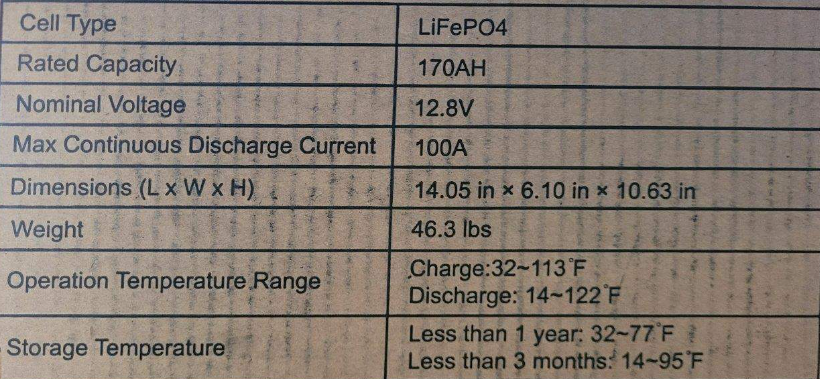
Maximum charge current
On the flip side of the coin, lithium battery will have a limit to how much current you can charge them with. Unless you have a crazy big solar array, or an AC charger that can do huge rates this is generally less important, but you should still check it out.
Number of cycles
Every lithium battery will come with a rating for the number of cycles its good to do. Many are around the 2500 cycles at 100% depth of discharge, and there are plenty that are less than this. To give you an idea, 2500 cycles is just under 7 years of discharging the battery completely, every single day.
If you only used a portion of the battery (say 50 – 60% depth of discharge) it’s going to do far more cycles, and that’s pretty amazing.
Warranty information
Lithium battery aren’t cheap, and what ever you buy, you want to know that if it all goes wrong you’ll be able to get your money back, or a replacement unit. Some lithium battery companies offer a pro-rated warranty arrangement, where you’d only get a portion of your money back (or credit) depending on how long you’ve had it for.One would hope not to use the warranty, but generally the amount and conditions speak volumes about the battery quality.
Lithium battery sizes
A lot of the lithium battery are similar sized, but you can get some interesting shape and sized units if you look around. The 170aH lithium battery is a good example of this, which is marginally taller than a normal 120aH battery.You can also get slim line battery which can be mounted in some pretty unique spots (in a false floor, or behind the rear seats of a dual cab) and I’ve seen some very clever installations over the years.
Conclusion
12V lithium ion battery have revolutionized the power storage landscape, offering high energy density, longer lifespan, and faster charging capabilities. By understanding their features, applications, advantages, maintenance requirements, safety considerations, battery management systems, and purchasing factors, users can make informed decisions and effectively utilize these battery in various industries and applications.
Common FAQs about 12V Lithium Ion Battery
What is the average lifespan of a 12V lithium-ion battery?
The average lifespan of a 12V lithium-ion battery can vary depending on several factors, including usage patterns, charging habits, and environmental conditions. Generally, a well-maintained 12V lithium-ion battery can last anywhere from 3 to 5 years or even longer. However, it’s important to note that the lifespan can be influenced by factors such as the number of charge cycles, depth of discharge, operating temperatures, and overall battery management.
Can 12V lithium-ion battery be used as a replacement for lead-acid battery?
Yes, 12V lithium-ion battery can be used as a replacement for lead-acid battery in many applications. Lithium-ion battery offer several advantages over lead-acid battery, including higher energy density, lighter weight, longer cycle life, and faster charging capabilities. They also have a lower self-discharge rate and require less maintenance compared to lead-acid battery. However, it’s crucial to ensure that the specific lithium-ion battery chosen is compatible with the intended application and adheres to the voltage and capacity requirements.
How do I properly dispose of a used 12V lithium-ion battery?
Proper disposal of used 12V lithium-ion battery is essential to prevent environmental contamination and ensure safe handling of hazardous materials. It is recommended to recycle lithium-ion battery through designated recycling centers or drop-off points. Many battery retailers, electronic stores, and recycling facilities offer battery recycling programs. It’s important to follow local regulations and guidelines for battery disposal in your area to ensure compliance with proper disposal practices and minimize environmental impact.
Can 12V lithium-ion battery be used in extreme temperatures?
12V lithium-ion battery have certain temperature limitations for optimal performance and safety. While they can operate within a wide temperature range, extreme temperatures can affect battery performance and may pose safety risks. High temperatures can accelerate the aging process, reduce battery capacity, and potentially cause thermal runaway. Similarly, extremely low temperatures can reduce battery performance and capacity temporarily. It is important to operate 12V lithium-ion battery within the recommended temperature range specified by the manufacturer to ensure safe and efficient operation.
What is the lifespan of a 12 volt lithium-ion battery?
The minimum lifespan most manufacturers expect from lithium-ion battery is around 5 years or at least 2,000 charging cycles. But, if well cared for and used in proper conditions, lithium-ion battery can last as long as 3,000 cycles.
How long can a 12V battery run a TV?
Based on my test, I’d say that, on average, a TV will run for around 15-20 hours straight on a 12V 100Ah lithium battery. And if you’re using a 12V 100Ah lead acid battery, I’d expect it to last for 7-10 hours of uninterrupted watch time, because lead acid battery can only be discharged to 50%.
How long can a 12V battery sit unused?
Most manufacturers recommend storing a battery for six to nine months maximum before use, and delaying use isn’t going to extend the battery’s lifespan of three to five years.
Can you leave a 12V battery charging overnight?
Even though there is no risk of overcharging with the use of a high quality charger, the battery should not remain connected to the charger for more than 24 hours.
Do lithium battery leak?
Lithium battery don’t leak like alkaline battery. They use non-aqueous electrolytes, reducing leakage risk. The battery design keeps the electrolyte contained, preventing leaks during regular use. Manly Battery is a trusted lithium manufacturer. We have a skilled R&D team and advanced battery factory. Our 12 volt lithium battery undergoes strict inspections before shipping.
Do lithium battery need to be vented?
No, lithium battery don’t need venting in normal operation. They are sealed systems, unlike lead-acid battery. Safety features like pressure relief valves or vents prevent excessive pressure buildup. These features release gases in case of malfunctions or abusive conditions, preventing battery rupture or explosions.


